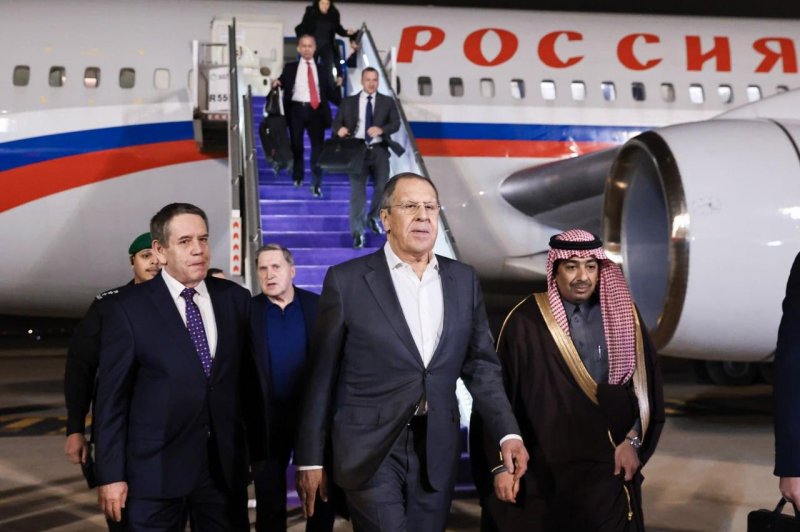Russian Foreign Minister Sergey Lavrov arrives in Riyadh, Saudi Arabia, on Monday for negotiations Tuesday with the United States. Photo courtesy of Russian Foreign Ministry/
FacebookFeb. 17 (UPI) — Russia’s foreign minister and his delegation arrived in Saudi Arabia on Monday for scheduled negotiations with the United States to end the war in Ukraine.
The talks are set to be held Tuesday in Riyadh. On Monday, the Russian Foreign Ministry posted a photo of Sergey Lavrov, the Kremlin’s top diplomat, deplaning from a Russian jet on a tarmac in Riyadh, announcing his and his team’s arrival for the high-profile discussions.
Lavrov’s U.S. counterpart, Secretary of State Marco Rubio, was already in Riyadh. On Monday, he held talks with Saudi Crown Prince Mohammed bin Salman, according to a State Department readout of the meeting, which made no mention of Ukraine.
The negotiations come some three weeks after President Donald Trump returned to the White House under a cloud of uncertainty over the future of Ukraine and the war.
The talks were scheduled after Trump and Russian President Vladimir Putin spoke over the phone last week, agreeing to start the negotiations “immediately.”
Trump’s resumption of communication with Russia marks a drastic U.S. policy change from his predecessor, President Joe Biden, who cobbled together the democratic world in a coalition to isolate Putin on the world stage.
Trump — who campaigned on an isolationist agenda, a vocal critic to sending Ukraine military aid and a frequent praiser of Putin — has made ending the war a priority, which has raised concerns over conditions of a potential peace deal with Russia.
During a United Nations Security Council meeting Monday in New York City marking the 10th anniversary of Minsk Agreements — which sought to end fighting between Russia and Ukraine following the Kremlin’s illegal annexation of Crimea — U.N. Assistant Secretary-General Miroslav Jenca said the now-defunct pacts show what happens when peacemaking fails.
“The Minsk Agreements have taught us that agreeing on a cease-fire or signing an agreement alone do not ensure a durable end to the violence,” He said. “Ensuring that the conflict does not recur and does not escalate will require genuine political will and understanding of its multidimensional complexities for Ukraine and for the region.”
Trump and his administration attracted criticism for appearing to capitulate to Russia, as they have signaled that a peace agreement will involve Ukraine relinquishing sovereignty over land seized by Russia and abandoning its near decade-long effort to join the voluntarily NATO defensive military alliance.
In the U.N. meeting, U.S. representative John Kelley stated world leaders “must recognize” that Ukraine returning to its pre-2014 borders is “an unrealistic objective” — reiterating the comments made last week to European leaders by U.S. Secretary of Defense Pete Hegseth, which signaled a vast political sea change was underway.
However, Kelley added that a durable peace must include “robust security guarantees to ensure the war will not begin again,” though he did not elaborate on what those guarantees would entail.
Amid concerns that Ukraine and Europe were being left out of the negotiating process, Kelley said they “need to be a part of the conversation.”
“We also call on other U.N. member states to join us in seeking an end to this conflict,” he said.
Britain and France have attempted to reassure Ukraine and the rest of Europe that there will be continued support for Kyiv and resistance against Russian aggression, even as the United States appears to be stepping back.
In strongly worded remarks, Barbara Woodward, Britain’s permanent representative to the United Nations, said the world must “stand firm” in support of peace and security, but that Putin’s proposals, which seemingly include Ukraine withdrawing from its sovereign territory, are unacceptable.
“We are clear that Ukraine’s voice must be at the heart of any negotiations,” she said.
Russia currently occupies about 20% of Ukrainian land, including Crimea, which the Kremlin illegally annexed in 2014.
